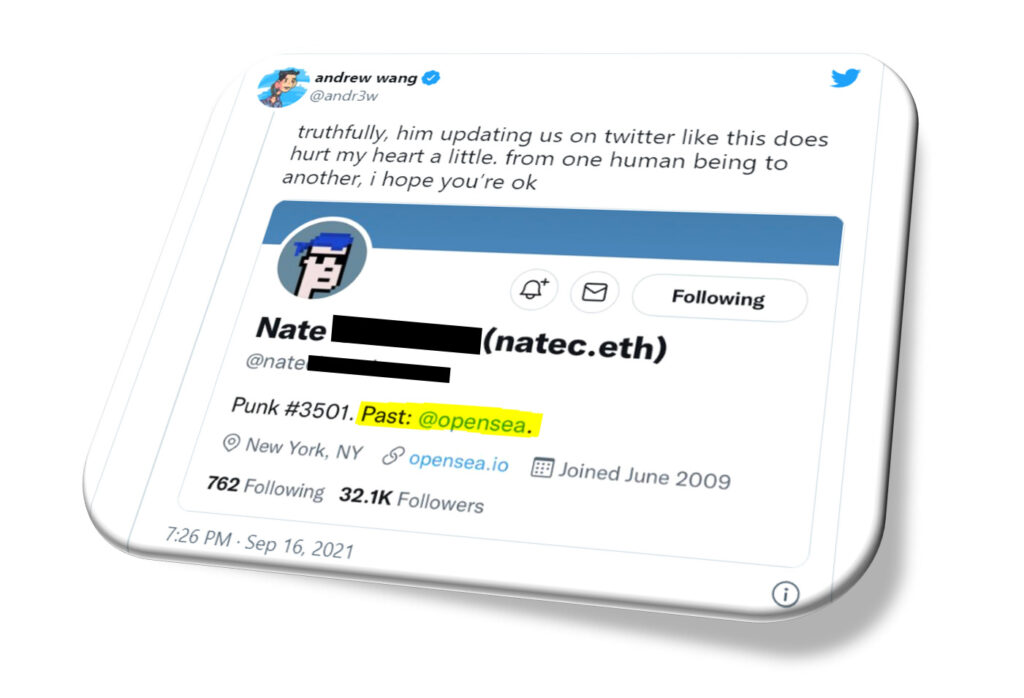In the secrecy of the next releases of NFT, this former head of OpenSea believed to fool market players without getting too wet. This was without counting on the FBI and the authorities’ growing expertise in tracking blockchain criminals.
Game-over. Try again. A former employee of OpenSea, the largest marketplace for NFTs, became a new mascot for the US Department of Justice on Wednesday. As announced by the New York prosecutor’s office in charge of the case, Nathaniel C. (31), ex-head of product for the crypto platform, inherited the title of “first defendant for insider trading linked to digital assets”.
Insider trading is a criminal scheme as old as the financial world, consisting of using confidential information for personal enrichment. A worn-out scheme that the accused would have brought up to date by applying it to the famous non-fungible tokens. Armed with exclusive commercial information, namely the sale on OpenSea of new NFT collections for which he was responsible, Nathaniel would have bought them at low cost before their release, to better resell them at a high price.
His machinery would have lasted a few months, from June to September last year. This allowed him to earn abnormal profits on around forty NFTs, resold at prices of two to five times the initial price. Presumed innocent at this stage of the proceedings, Nathaniel faces charges of wire fraud and money laundering, each of which carries a maximum sentence of 20 years in prison.
” The charges demonstrate our commitment to eradicating insider trading — whether it occurs in the stock market or on the blockchain said prosecutor Damian Williams. To which the deputy director of the FBI in charge of the investigation, Michael J. Driscoll, felt good to add that the authorities will continue ” to aggressively pursue players who choose to manipulate the market in this way. »
Anonymous accounts and Ethereum addresses
It is that, in the opinion of the prosecutor, the feds have done a “remarkable job”. But the investigation also relied on the young branch of the ministry dedicated to cryptos, the National Cryptocurrency Enforcement Team. Officially inaugurated in February 2022, the NCET’s mission is to combat this growing crime that benefits from the galloping innovation of digital assets and decentralized technologies.
Although the suspect constitutes a sad pioneer on the hunting board of American justice, the present case does not have the eminence of the Bitfinex affair for which the authorities had found the equivalent of $ 3.6 billion in stolen bitcoins . That said, the indictment issued by the prosecutor is worth seeing. This ten-page document once again clearly demonstrates that blockchain cannot be used as a financial crime weapon. The degree of anonymity remaining imperfect in the face of immutable traceability.
” To conceal the fraud, the accused made his purchases and resales (of NFT) using anonymous wallets and anonymous accounts on OpenSea “, underlines the prosecutor Williams, before explaining that these tokens constitute digital identifiers kept on the blockchain, a decentralized register inventorying all the transactions.

Nothing a stroke of genius
Since most NFTs are built on Ethereum, transfers require Ethereum addresses, a “public unique identifier” on the blockchain like an email address. But, unlike our e-mail boxes, exchanges from one address to another are recorded and can be consulted with free access. In an attempt to further cover their tracks, Nathaniel would also have transferred funds to multiple “anonymous” Ethereum addresses, addresses with no history of previous transactions.
Curious to discover the techno engineering that the police used to identify the suspect, we will remain unsatisfied, because the judicial act does not offer more crisp details.
Violating the confidentiality clause of his employer at the time and resorting to various fraudulent artifices to earn money, Nathaniel will have to return all the advantages drawn from this fraud. And if, in the meantime, the defendant has assigned to a third party or moved the money and property resulting from this financial crime beyond the reach of the court, “the United States intends to effect any confiscation of any property be it from the defendant” in compensation.
For the record, OpenSea had suspected its former employee and immediately demanded his resignation. “ Incredibly disappointed “, the co-founder Devin Finzer had declared to take the necessary measures in order to regain the confidence of the community. ” For a new, more open internet that empowers creators and collectors, we will need to build trust and transparency into everything we do. “Which act.
